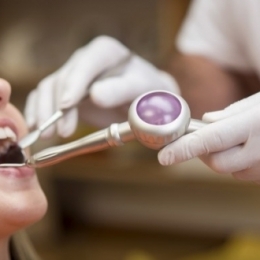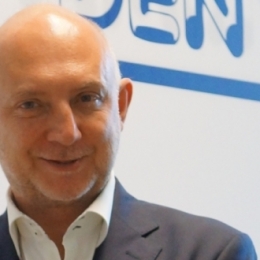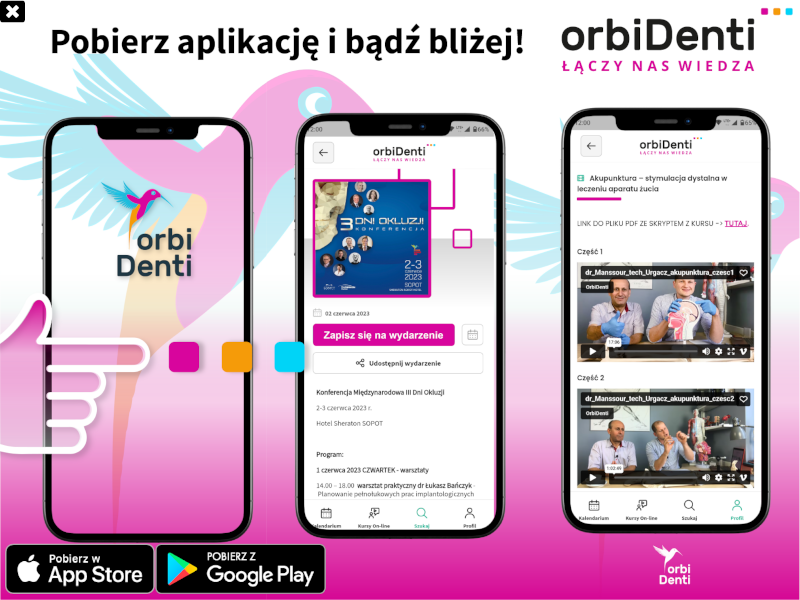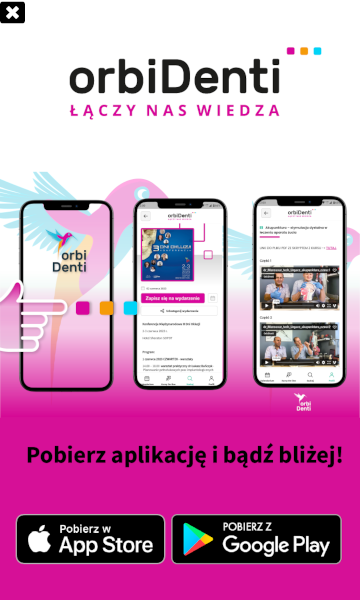James Chow: AI Empowered Full Arch Protocol - from AI, navigation systems and photogrammetry to robotic surgery
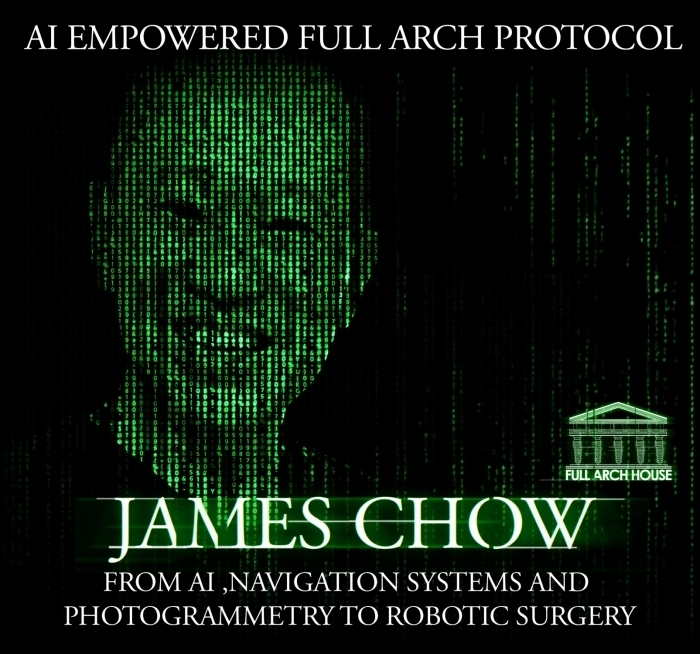
James Chow: AI Empowered Full Arch Protocol - from AI, navigation systems and photogrammetry to robotic surgery
Język: angielski (bez tłumaczenia na język polski)
Data: 20-21 maja 2026 r.
Cena:
11900 zł - do 28 lutego 2026
Lokalizacja: Sofitel Grand Sopot Hotel, ul. Powstańców Warszawy 12/14, 81-718 Sopot
W przypadku rezygnacji zgłoszonej do 22 kwietnia 2026 zwracamy opłatę w pełnej wysokości minus 200 zł plus Vat, po tym terminie rezygnacje nie będą przyjmowane.
Faktury Vat wystawiane są na podstawie wniesionej opłaty.
James Chow - AI Empowered Full Arch Protocol - from AI ,navigation systems and photogrammetry to robotic surgery
“AI-Integrated Full Arch Rehabilitation Protocol: Advancements in Navigation, Imaging, Robotic Surgery, and Manufacturing Techniques”
James Chow – Scientific Perspectives on Next-Generation Implantology
This specialised programme provides a comprehensive exploration of advanced technological integration in full arch implant rehabilitation, with a distinct focus on dynamic navigation, imaging modalities, robotic-assisted surgical procedures, and manufacturing techniques pertinent to immediate loading protocols.
Dynamic navigation systems represent a transformative advancement in implantology, offering real-time, computer-guided intraoperative feedback. This technology enhances procedural accuracy and enables precise adaptation to intraoperative variables, surpassing the limitations of freehand or static guide approaches. Participants will develop proficiency in the use of dynamic navigation, including system setup, calibration, and troubleshooting, ensuring optimal implant placement even in complex anatomical scenarios.
A critical analysis will be undertaken to contrast intraoral scanning with photogrammetry in the context of digital impression acquisition. While intraoral scanners have become ubiquitous due to their accessibility and convenience, photogrammetry offers superior accuracy in capturing the spatial relationships of multiple implants within a full arch. The programme elucidates when photogrammetry provides a significant diagnostic and restorative advantage, particularly in the context of immediate loading protocols where micron-level precision is paramount.
Robotic-assisted surgery in implantology has generated significant interest, but it is imperative to differentiate between the current capabilities and the projected potential of these systems. The course rigorously examines the evidence for robotic guidance in implant placement, especially for complex indications such as Zygomatic implants, dissecting the balance between technological optimism and the clinical realities—including workflow integration, cost, and reproducibility of outcomes.
Furthermore, the significance of manufacturing techniques in prosthetic fabrication for immediate loading is addressed. The course provides a scientific comparison between additive (3D printing) and subtractive (milling) manufacturing methods. 3D printing enables rapid, cost-effective, and intricate prosthesis production, while subtractive techniques offer established material properties and precision. Critical evaluation of both processes considers material science, biomechanical performance, and clinical application, equipping clinicians to make evidence-based decisions tailored to specific patient needs.
Through an integration of didactic lectures, practical demonstrations, and case-based discussions, this course empowers oral surgeons, prosthodontists, and implantologists to adopt a scientifically grounded, technologically enhanced workflow—improving accuracy, efficiency, and patient outcomes in complex full arch rehabilitations.
Course Synopsis
This two-day intensive course, led by Dr. James Chow, a renowned specialist in oral and maxillofacial surgery with over three decades of experience in dental implants, computer-assisted surgery, Zygomatic implants, and immediate loading protocols, explores the integration of artificial intelligence (AI) and cutting-edge technologies into full arch implant rehabilitation. Titled “AI Empowered Full Arch Protocol - from AI, Navigation Systems and Photogrammetry to Robotic Surgery,” the program bridges foundational concepts with advanced applications, empowering clinicians to enhance precision, efficiency, and patient outcomes in complex edentulous cases. Participants will gain insights into AI-driven diagnostics, dynamic navigation, photogrammetric scanning, and robotic-assisted implant placement, combining didactic lectures, interactive discussions, and hands-on demonstrations. Held in Poland in May 2026, this course is designed for oral surgeons, prosthodontists, and implantologists seeking to adopt innovative workflows in their practice.
Learning Objectives
By the end of this course, participants will be able to:
1. Understand the role of AI in preoperative planning, risk assessment, and predictive modelling for full arch implant protocols.
2. Demonstrate proficiency in utilizing navigation systems for real-time guidance during implant surgery, including setup, calibration, and troubleshooting.
3. Apply photogrammetry techniques for accurate digital impressions and prosthetic design in full arch restorations, integrating them with immediate loading strategies.
4. Evaluate the advantages and limitations of robotic surgery in implant placement, particularly for challenging anatomies like Zygomatic implants.
5. Integrate a comprehensive AI-empowered workflow from diagnosis to postoperative evaluation, optimizing for efficiency, accuracy, and patient safety.
6. Analyse clinical case studies to identify best practices and potential complications in technology-assisted full arch procedures.
7. Develop strategies for incorporating these technologies into daily practice, including ethical considerations and interdisciplinary collaboration.
Course Program
Day 1: Foundations of AI and Technology in Full Arch Protocols (Focus on AI, Navigation, and Photogrammetry)
Target Audience: Oral surgeons, prosthodontists, implantologists, and dental professionals with intermediate to advanced experience in implantology.
Format: Lectures, interactive Q&A, and live demonstrations.
- 8:00 AM – 8:30 AM: Registration and Welcome
Introduction by Dr. James Chow, including an overview of his expertise in Zygomatic implants, immediate loading, and computer-assisted surgery. Coffee and networking.
- 8:30 AM – 10:00 AM: Session 1 – AI in Full Arch Implant Planning
Explore how AI algorithms revolutionize diagnostics and treatment planning for edentulous patients. Topics include AI-driven CBCT analysis for bone segmentation, automatic planning, and virtual simulations for full arch restorations. Dr. Chow will discuss integration with Zygomatic implants in the digital workflow for atrophic maxilla cases.
Interactive Element: Group discussion on hype and reality of AI in clinical practice.
- 10:00 AM – 10:15 AM: Coffee Break
- 10:15 AM – 12:00 PM: Session 2 – Navigation Systems for Precision Implant Placement
In-depth review of dynamic navigation technologies, including system setup, fiducial markers, and real-time tracking. Participants will learn calibration techniques and applications in full arch protocols, with emphasis on reducing surgical errors and enabling immediate loading. Case examples from Dr. Chow's practice will highlight navigation in complex anatomies.
Hands-On Demonstration: Live simulation of navigation-guided implant placement using demo models.
- 12:00 PM – 1:00 PM: Lunch Break
- 1:00 PM – 3:00 PM: Session 3 – Photogrammetry in Digital Workflows
Delve into photogrammetry as a non-invasive tool for capturing intraoral data, creating accurate 3D models for prosthetic design. Comparison of intraoral scanning and photogrammetry for precise full arch impressions. Cover integration with AI for automated alignment, error detection, and full arch impressions. Dr. Chow will address its synergy with immediate loading and Zygomatic implants for streamlined restorations.
Interactive Element: Workshop on photogrammetric scanning techniques using provided equipment.
- 3:00 PM – 3:15 PM: Afternoon Break
- 3:15 PM – 5:00 PM: Session 4 – Integrating Day 1 Technologies: Case Studies and Q&A
Review real-world cases combining AI, navigation, and photogrammetry. Participants will analyse outcomes, complications, and optimizations. Open forum for questions, with Dr. Chow sharing tips from his extensive experience.
Closing for Day 1: Key takeaways and preview of Day 2.
Day 2: Advanced Applications and Robotic Surgery (Focus on Robotics and Comprehensive Workflow Integration)
Format: Lectures, hands-on workshops, and panel discussions.
- 8:00 AM – 8:30 AM: Recap and Coffee
Brief review of Day 1 concepts and participant feedback.
- 8:30 AM – 10:30 AM: Session 5 – Introduction to Robotic Surgery in Implantology
Examine robotic systems for enhanced precision in full arch procedures, including haptic feedback, automated drilling, and path planning. Dr. Chow will cover indications for robotics in Zygomatic and angled implants, comparing them to traditional methods.
Hands-On Demonstration: Guided robotic simulation on phantom models.
- 10:30 AM – 10:45 AM: Coffee Break
- 10:45 AM – 12:30 PM: Session 6 – AI-Empowered Robotic Workflows
Integrate AI with robotics for predictive analytics, intraoperative adjustments, and postoperative monitoring. Topics include machine learning for complication prediction and full arch protocol optimization. Case studies will showcase immediate loading success rates with robotic assistance.
Interactive Element: Small-group exercises on workflow design.
- 12:30 PM – 1:30 PM: Lunch Break
- 1:30 PM – 3:30 PM: Session 7 – Hands-On Workshop: Full Arch Protocol Simulation
Practical application of all technologies covered. Participants will rotate through stations for AI planning, navigation-guided placement, photogrammetry scanning, and robotic-assisted surgery on models. Dr. Chow will provide personalized guidance, emphasizing Zygomatic implants and immediate loading.
Note: Limited spots; equipment provided.
- 3:30 PM – 3:45 PM: Afternoon Break
- 3:45 PM – 5:00 PM: Session 8 – Future Directions, Complications, and Certification
Discuss emerging trends in AI and robotics, potential pitfalls, and mitigation strategies. Panel Q&A with Dr. Chow. Course wrap-up with certificates of completion and resources for further learning.
Closing: Networking reception.
Additional Notes:
- CE Credits: Pending approval for continuing education credits.
- Materials: All participants receive digital course notes, access to recorded sessions, and a toolkit of resources.
- Registration: Details available via [contact/email/website – to be provided]. Limited to [e.g., 50] attendees for interactive focus.
- Prerequisites: Basic knowledge of dental implants recommended.





